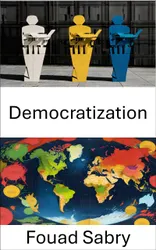Understanding political behavior is vital for those interested in political science, public policy, or social dynamics. This guide covers psychological, sociological, and rational choice theories, offering insights into how individuals and groups engage with political processes.
1-Theories of Political Behavior-Overview of primary theories explaining political behavior, laying the groundwork for future chapters.
2-Opinion Poll-Learn methodologies and significance of opinion polls in gauging public sentiment and predicting elections.
3-Philip Converse-Explore Philip Converse's contributions to political behavior, focusing on mass belief systems and sophistication.
4-Political Campaign-Understand strategies and psychological tactics in campaigns that influence voter behavior and decision-making.
5-Voter Turnout-Examine factors affecting voter turnout, including social, economic, and political influences on democracy.
6-Independent Voter-Delve into independent voters' characteristics and behaviors, crucial in elections and political dynamics.
7-Party Identification-Discover how party identification shapes political attitudes and serves as a heuristic for decision-making.
8-Political Apathy-Investigate causes and consequences of political apathy, and how disengagement affects democratic participation.
9-Voting Behavior-Analyze models of voting behavior for a nuanced understanding of voter motivations.
10-Political Polarization in the US-Explore the growing divide in American politics, its origins, and its impact on governance and cohesion.
11-Republican Party (US)-Insights into the history, ideology, and voter base of the Republican Party in US politics.
12-Hispanic and Latino Americans-Understand political attitudes and behaviors of Hispanic and Latino Americans and their influence.
13-Hispanic and Latino Americans in Politics-Delve into political participation and representation of Hispanic and Latino Americans.
14-Voter Turnout in US Presidential Elections-Analyze historical voter turnout trends and their determinants in presidential elections.
15-Genopolitics-Explore genopolitics, studying the genetic basis of political behavior.
16-LGBT Demographics of the US-Examine political attitudes and participation of LGBT individuals in the US
17-Biology and Political Orientation-Investigate biological factors that influence political orientation and behavior.
18-Michigan Model-Learn about the Michigan Model emphasizing party identification, candidate evaluation, and issues.
19-Latino Vote-Understand the Latino vote's significance in US elections and influencing factors.
20-Sexism in American Political Elections-Explore how sexism affects campaigns, candidate evaluation, and voter behavior in the US
21-Demographics of the Democratic Party (US)-Insights into the demographic composition and behavior of Democratic Party supporters.
























